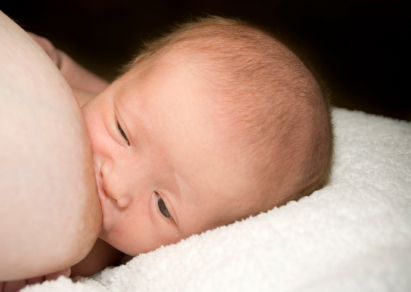Not enough breastmilk?
March 18, 2008
Breastfeeding is highly influenced by the mother’s emotional and psychological wellbeing. Low levels of stress, healthy nutrition, plenty of fluid intake, emotional support and nipple stimulation through baby’s sucking are all important contributors to breastfeeding success. However, living circumstances often don’t allow perfect breastfeeding conditions: another child in the family, the death of a loved one, money worries etc. all add to an increase in stress levels. Other factors such as breast surgery can contribute to low amounts of breast milk. It has also been found that more women who gave birth by caesarean section encountered breastfeeding problems. This may have various reasons such as the initial separation between mother and baby or the physical pain as a result of the surgery which ultimately affects the mother’s ability to enjoy the breastfeeding experience.
While the WHO’s (World Health Organization) guidelines of how long to breastfeed clearly state that baby’s physical and psychological health benefit most when breastfed for at least six months, inexperienced mothers often despair when they feel they do not produce enough breast milk to satisfy their baby. It can be an emotional rollercoaster when new mothers have to face personal stress as well as the fact that breastfeeding does not go “according to plan”. This downward psychological spiral inevitably results in the production of lower amounts of breast milk. Consequently, mothers often give up breastfeeding much earlier than the recommended minimum time of six months.
The following suggestions may help to increase the production of breast milk by either calming mother’s nerves and her system or by encouraging the body to produce more.
– It is vital to rest when breastfeeding, so rest when baby is sleeping too.
– The following herbs are known to help increase breast milk production:
Fennel, Raspberry Leaf, Alfalfa, Nettle, Hops, Blessed Thistle and Goat’s Rue.
o Fennel tea: It helps in different ways: it encourages natural breast milk production and helps soothe indigestion and baby’s colic. Its compounds help balance the female hormone levels and are thus very good for calming the nerves.
o Raspberry Leaf tea: It is recommended to be taken well before giving birth, in the third trimester, to help soften the uterus and thus ease the birth process. It is also very good to be taken after birth as it is full of vitamins and minerals and it is proven to help with the recovery.
o Alfalfa is a more common galactogogues (breast milk increasing herbs). Alfalfa proteins are rich in amino acids which are known to supplement any lack in nutrition and thus, help the improve milk quality and production.
o Nettle tea: like Alfalfa, nettle is full of vitamins and minerals which will help improve the quality of the milk.
o Hops: it has been known for centuries that it helps with breast milk production; however, it should not be taken over a long period of time as it can cause depression and make you sleepy. If you tend to have a depressive nature, it may be better to stay away from hops.
o Blessed Thistle: it is known to stimulate milk production effectively; it is a breast milk booster in combination with Raspberry Leaves.
o Goat’s Rue: it is very powerful and has shown to increase milk production by up to 50% in some cases as it may also stimulate the development of the mammary glands. It has no reported side effects.
– Another more hands-on way of promoting breast milk production is simple pumping. As nipple stimulation helps the milk supply it is important to let baby suckle as long as possible or necessary. After a few days milk levels should be increased.
In our modern world many may find it difficult to relax and to rest. Having a baby, giving birth and breast feeding are all dependent on the body’s efficient work force. Please remember to allow yourself time to sleep and relax as much as possible in order to experience a more enjoyable time with your baby!
Nurture your baby naturally at www.babysbest.co.uk



